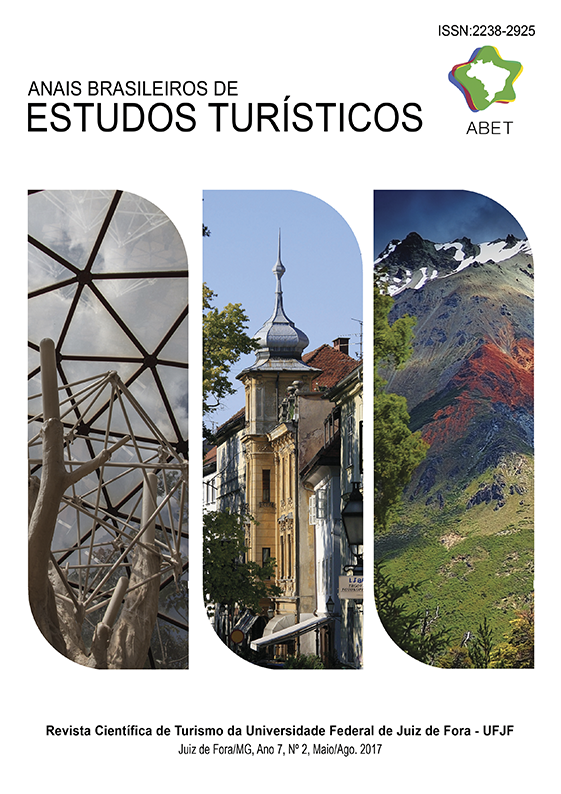Sistematização da Disciplina do Turismo
DOI:
https://doi.org/10.34019/2238-2925.2017.v7.3167Palabras clave:
Educação, Turismo, Desafios, PossibilidadesResumen
Este ensaio propõe a análise do entendimento sobre o turismo e a identificação de princípios fundamentais e desejáveis ao turismo a partir deles. Tal sistematização resulta na proposição de um entendimento do turismo como domínio único de estudos, de contornos definidos pela delimitação de seus elementos constituintes, dentre os quais elementos da indústria turística, da experiência do turista, da ciência do turismo e de valores desejáveis ao turismo. Conclui-se que a disciplina do turismo pode ser definida como o estudo dos deslocamentos, movimentos ou viagens de pessoas que envolvem alguma motivação turística, não exclusiva, e o despendimento de tempo e dinheiro, parcial ou exclusivamente, em estabelecimentos, serviços ou produtos da indústria turística.
Descargas
Citas
AIREY, D.; JOHNSON, S. The profile of Tourism Studies Degree Courses in the UK: 97/98. Guideline n. 7. London: National Liaison Group for Higher Education, NGL, 1998.
AIREY, D.; TRIBE, J. (Orgs.). An International Handbook of Tourism Education. Oxford: Elsevier,
2005.
AMOAH, V., BAUM, T. Tourism education: policy versus practice. Intematianal Joumal of Cantemporary Hospitality Management, vol. 9, n. l, pp. 5-12, 1997.
ANSARAH, M.; REJOWSKI, M. Panorama do ensino em turismo no Brasil: graduação e pós-graduação. Revista Turismo em Análise, v 7, n. 1, 1996.
BOTTERILL, D.; GALE, T. Postgraduate and Ph.D. Education. pp. In: AIREY, D.; TRIBE, J. An International Handbook of Tourism Education. 2005.
BUSBY, G. Experiência de trabalho e vínculos com a indústria. Educação internacional em turismo 16 (2), p. 1135, 2008.
CORBUCCI, P. R. Avanços, limites e desafios das políticas do MEC para a educação superior na década de 1990: ensino de graduação. 2002.
CUNHA, L. Licenciatura em Turismo da Universidade Lusófona de Humanidades e Tecnologias. Revista de Humanidades e Tecnologias, 9, pp. 77-88, 2003.
DALE, C.; ROBINSON, N. The theming of tourism education: A three-domain approach. International Journal of Contemporary Hospitality Management, 13(1), pp.40-34, 2001.
DURHAM, E.; SAMPAIO, H. O setor privado de ensino superior na América Latina. Cadernos de Pesquisa, n. 110, pp. 7-37, 2000.
ECHTNER, C. M. Tourism education in developing nations a three pronjed approach. Tourism Recreation Research, V. XX, n.2, p. 32-41, 1995.
EVANS, J. Tourism Graduates: a case of over production. Tourism Management, v. 14, n. 4, pp. 243-246, 1993.
FÚSTER, L. Introducción a la teoría y técnica del turismo. Alianza Universidad textos. Madrid, 1991.
KNOWLES, T.; TEIXEIRA, R. M.; EGAN, D. Tourism and hospitality education in Brazil and the UK: a comparison. International Journal of Contemporary Hospitality Management, 15(1), 45-51, 2003.
LEHER, R. Um novo senhor da educação? A política educacional do Banco Mundial para a periferia do capitalismo. Outubro, 1(3), 19-30, 1999.
MacLAURIN, D. Tourism Education in Canada: Past, Present and Future Directions. In: HSU, C. (Ed.) Global tourism higher education: past, present and future. Binghamton, NY, USA: The Haworth Hospitality Press, 2005.
OMT - ORGANIZACIÓN MUNDIAL DE TURISMO. Datos esenciales. Madrid, 1996. p.1-5.
SGUISSARDI, V. O Banco Mundial e a educação superior: revisando teses e posições. Universidade e Sociedade 10 (22), 2000.
SIGALA, M.; BAUM, T. Trends and issues in tourism and hospitality higher education: Visioning the future. Tourism and hospitality research, 4(4), 367-376, 2003.
TRIBE, J. Overview of Research. (pp. 26-43). In: AIREY, D.; TRIBE, J. (Eds.), An international handbook of tourism education Oxford: Elsevier, 2005.
TRIGO, L. G. G. Cronologia do Turismo no Brasil. São Paulo: CTI. Terra, 1991.
Descargas
Publicado
Cómo citar
Número
Sección
Licencia
This journal provides immediate open access to its content, following the principle that providing free scientific knowledge to the public provides greater democratization of world knowledge.
Authors must agree to the following terms relating to copyrights:
(a) Authors keep all copyright and grant the to the journal the right of first publication, with the work simultaneously licensed under the Creative Commons Attribution License that allowing job sharing with recognition of authorship of the work and initial publication in this journal.
(b) Authors are allowed to assume additional contracts separately, for non-exclusive distribution of the version of the work published in this journal (e.g. publish in institutional repository or book chapter), with recognition of authorship and initial publication in this magazine.
(c) Authors are allowed and are encouraged to publish and distribute their work online (e.g. in institutional repositories or on your personal page) since they do not do this before or during the editorial process, as this can generate productive interchange, as well as increase the impact and citation of work aired. (See Effect of Free Access).















